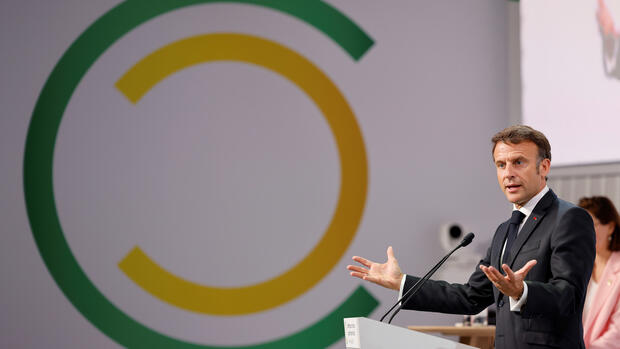Berlin, Paris French President Emmanuel Macron likes to think big when it comes to diplomatic initiatives. The goal of the North-South summit organized by his government also sounds ambitious: Leading economies, emerging economies and developing countries should set the course for a “new global financial pact” to reform lenders such as the World Bank and the International Monetary Fund (IMF) and strengthen them towards financing climate protection.
Representatives from more than 100 countries came to Paris on Thursday for the two-day summit, including many heads of state and government from Asia and Africa, Saudi Arabia’s crown prince
Mohammed bin Salman, as well as UN Secretary General António Guterres and EU Commission President Ursula von der Leyen.
But almost all European governments are only represented at ministerial level, and US President Joe Biden has also sent his Treasury Secretary Janet Yellen. After all, Chancellor Olaf Scholz (SPD) agreed, he is the only head of government of a G7 state on site alongside Macron. Macron’s North-South Summit seems to resonate more in the poorer South than in the richer North.
Europe and the USA actually have an interest in reforming the financial institutions of the Bretton Woods system, which they have shaped significantly over the past eight decades. The financial architecture, which is dominated by the West, is becoming less and less attractive, while China is expanding its geopolitical influence by lending to African countries in particular – even if Beijing’s lending has declined in the meantime as a result of the corona pandemic.
Li Qiang’s journey went from Berlin to Paris
In his opening speech, Macron called for countries from other parts of the world to play a more important role in the World Bank and IMF alongside Europe and the USA. “We have a financial system that reflects a consensus from the past,” he said. However, no decisions are to be expected at the summit in Paris, and in French government circles they are hoping at best for a roadmap for the further reform process.
>> Read here: How Beijing is changing the international financial architecture with massive bailout loans
Meanwhile, China has been creating facts for years. Although Beijing is also represented at the conference, Prime Minister Li Qiang traveled directly to Paris after the German-Chinese government consultations in Berlin. But the Chinese government is pursuing its own agenda with bilateral loans, for example as part of the Silk Road Initiative and the Asian Infrastructure Investment Bank.
French President Emmanuel Macron receives Mahamat Idriss Deby, Interim President of the Republic of Chad.
(Photo: dpa)
According to a study published in spring by the Kiel Institute for the World Economy (IfW), China has also granted rescue loans totaling 240 billion US dollars to more than 20 countries since 2010 that were no longer able to service their debts to the People’s Republic on time. That corresponds to more than 20 percent of the total loans that the IMF has distributed in the past ten years.
Provide more support to developing and emerging countries
Among the Chinese debtors are not only developing countries, but also countries like Turkey and Argentina. “The dominance of international financial institutions such as the International Monetary Fund is continuing to decline,” explained Christoph Trebesch, head of the Research Center for International Financial Markets and Macroeconomics at the IfW and one of the authors of the study.
The economist Jeromin Zettelmeyer, director of the Brussels think tank Bruegel, believes it is necessary for Europe and the USA to allow developing and emerging countries to increase their shares in the multilateral development banks and thus give them more political control. On top of that, the West must make additional funds available to the development banks, especially for climate protection.
Without the contribution of the private sector, sovereign wealth funds and foundations, we will not be able to meet the challenges. French President Emmanuel Macron
Macron also called for more support for developing and emerging countries in the fight against climate change. What is needed is a “funding shock” for the poorer countries, which at the same time would be hit hardest by the effects of climate change. Public financiers alone could not handle the investments. “Without the contribution of the private sector, sovereign wealth funds and foundations, we will not meet the challenges
can,” emphasized Macron.
Chancellor Scholz was expected to attend the official summit dinner in Paris on Thursday evening. On Friday morning, the Chancellor then wanted to take part in a working session of the heads of state and government. Solutions for over-indebted countries should also be discussed there. “No country should have to wait years for debt relief,” Scholz, Biden, Macron, Lula and a host of other leaders wrote in a joint op-ed. “We need stronger, more timely cooperation on debt for both low-income and middle-income countries.”
More: The Manifesto: We need an ecological turnaround that doesn’t leave anyone behind

